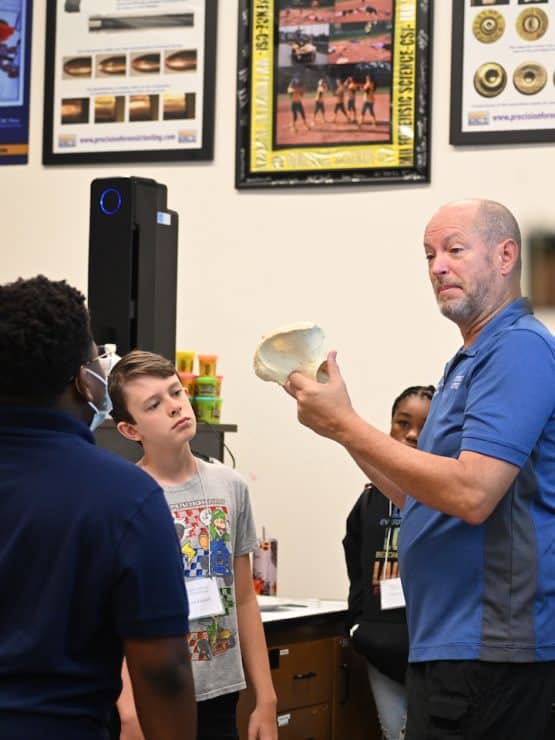
General Science Education
The General Science Education (9-12) program at Methodist University will prepare students for a career as a science educator in the high school classroom. Our program will provide all of the necessary knowledge and teaching skills for you to succeed on this endeavor.
Common Career Paths
Some of the top jobs for those with General Science Education bachelor degrees include biological science teacher, forestry and conservation science teacher, physical science teacher, chemistry teacher, physics teacher, and so much more.
Common Salary Ranges for Graduates
As mentioned above, there’s a long list of career opportunities for those with General Science Education degrees. But, the U.S. Bureau of Labor Statistics reports the average annual salary for the following positions (which may require additional education) in North Carolina in 2021:
- Biological science teacher: $98,710
- Forestry and conservation science teacher: $93,510
- Physical science: $97,110
- Chemistry teacher: $94,060
- Physics teacher: $99,480
Average Tuition Cost
The average cost for an incoming residential freshman to attend MU is less than $18,000 – similar to the cost of attending one of the big-box public schools, but with the enhanced value of a highly-regarded private school with a 12:1 student-to-faculty ratio.
While tuition varies, depending on a student’s financial aid package, it’s important to know that the average financial award for an incoming residential freshman at MU is more than $34,000.
Financial Aid & Scholarships
More than 97% of MU students receive some form of financial aid, with the University offering more than $24 million annually to students for scholarships. If a student is active military, family of active military, or a veteran, they may also qualify for MU’s military education benefits.
Interested in Methodist University’s General Science Education (9-12) program?
If you have questions, reach out to Dr. Patricia Fecher using the contact info at the bottom of the page. If you’re ready to apply today, click the button below!
Major Requirements
The General Science major consists of 90 credits and is distributed as follows:
Content Course Requirements
38 credits
| BIO 1530/1531 Fundamentals of Biology I with Lab (4) | GSC 1600 Physical Geology (4) |
| BIO 1560/1561 Fundamentals of Biology II with Lab (4) | GSC 2000 Physical Oceanography and Meteorology (4) |
| CHE 1510/1511 General Chemistry I with Lab (4) | MAT 2310 Calculus I (3) or higher |
| CHE 1520/1521 General Chemistry II with Lab (4) | PHY 1510 General Physics I (4) |
| ENM 1010 Environmental Science (3) | PHY 1520 General Physics II (4) |
General Science Electives
Select 3 courses (12 credits) from the following list:
| BIO 2430 Introductory Zoology (4) | GSC 2200 Planetary Geology AND Astronomy (4) |
| BIO 2440 Introduction to Botany (4) | GSC 3000 Advanced Geology (4) |
| CHE 2210/2211 Organic Chemistry I with Lab (4) |
Teacher Professional Licensure
40 credits
Students must earn a final grade of C or better in all courses with an EDU or SPE prefix.
| EDU 1420 Field Experience I (1) | EDU 4070 Professional Orientation (2) |
| EDU 2000 Human Growth & Development (3) | EDU 4150 Methods for Secondary Science (3) or
EDU 4470 Middle Grade Methods (3) |
| EDU 2400 Instructional Technology (2) | EDU 4190 Seminar in Positive Behavior Development (3) |
| EDU 2420 Field Experience II (1) | EDU 4200 Reading & Writing in the Content Areas (6-8, 9-12) (3) |
| EDU 2510 Foundations of Education (3) | *EDU 4210 Student Teaching (10) |
| EDU 3300 Educational Psychology (3) | EDU 4500 Seminar in Education (2) |
| EDU 3420 Field Experience III (1) | SPE 2550 Educating Diverse Populations (3) |
Licensure Testing Requirements
0 credits
| ETS Praxis I Core Academic Skills Test for Educators or requisite ACT/SAT passing scores (test codes: 5713, 5723, 5733, or combined test code: 5752) | ETS Performance Assessment (PPAT) |
| Praxis II, Secondary Education Science (test code: 5435) |
*A final grade of B or better is required in this course to apply for a North Carolina Teacher License
NC State Board of Education Complaint Process
The North Carolina State Board of Education (SBE) has jurisdiction to investigate allegations of noncompliance regarding specific laws and rules. Complaints may address Educator Preparation Program requirements set forth in Article 15(D) of Chapter 115C. The SBE does not have jurisdiction over complaints related to contractual arrangements with an EPP, commercial issues, obtaining a higher grade or credit for training, or seeking reinstatement to an EPP. All complaints filed with the SBE must be in writing. A person or entity may file a written complaint with SBE by filling out a complaint form and submitting online and/or mailing or faxing a hard copy to the address on the form.
Contact
Patricia Fecher, Ed.D.

